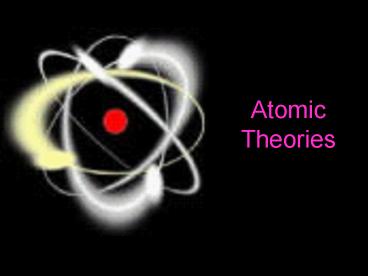Atomic Theories - PowerPoint PPT Presentation
1 / 25
Title:
Atomic Theories
Description:
Atomic Theories. Describe this muffin- Period 1. Describe this ... Describe this muffin- Period 3. Describe this Baseball- Period 3. Describe ... chip muffin ... – PowerPoint PPT presentation
Number of Views:233
Avg rating:3.0/5.0
Title: Atomic Theories
1
Atomic Theories
2
Describe this muffin- Period 1
3
Describe this Baseball- Period 1
4
Describe this peach- Period 1
5
Describe this onion- Period 1
6
Describe this muffin- Period 3
7
Describe this Baseball- Period 3
8
Describe this peach- Period 3
9
Describe this onion- Period 3
10
Describe this muffin- Period 5
11
Describe this Baseball- Period 5
12
Describe this peach- Period 5
13
Describe this onion- Period 5
14
Describe this muffin- Period 6
15
Describe this Baseball- Period 6
16
Describe this peach- Period 6
17
Describe this onion- Period 6
18
Review from reading
- An atom is made up of protons, neutrons and
electrons. - The protons and neutrons are found in the nucleus
- There has to be an equal number of protons and
electrons - Atomic mass is the number of protons and neutrons
- Atomic number is the number of protons (which is
the same as the number of electrons)
19
John Dalton
- Early 1800s
- Pool Ball/Bowling Ball
- Thought atoms were smooth, hard balls.
- Cannot be broken into smaller pieces or divided
- All elements are made of atoms
- Atoms of different elements have different masses
and characteristics - An atom of one element cannot be changed into an
atom of a different element. - Atoms cannot be created nor destroyed only
rearranged. - Compounds are made of atoms from different
elements
20
J.J. Thomson
- 1897
- Berry or chocolate chip muffin
- An atom consists of negative charges scattered
throughout a ball of positive charges.
21
Ernest Rutherford
-
-
-
-
- (one of Thomsons students)
- 1911
- Peach
- Positive charge (protons) is located in the
center of the atom - Center is called the nucleus.
- Almost all of the atoms mass is located in the
nucleus. - Atom is mostly empty space with the electrons
moving around the nucleus.
-
-
-
22
Neils Bohr
- (student of Thomsom and Rutherford)
- 1913
- Sliced Red onion Planets in the solar system
- Electrons could have only specific amounts of
energy, leading them to move in certain orbits
23
Modern Scientists
- 1920s
- Fan/Cloud
- Electrons do not orbit the nucleus like planets
- Electrons are in a cloudlike region around the
nucleus. - Electrons of the same energy are in the same
energy level.
24
James Chadwick
- 1932
- Fan/Cloud
- Found that the atom has a particle that was
electrically neutral (neutron).
25
Review Questions
- 1. How is Thompsons atomic model different than
Daltons? - 2. How is Bohrs atomic model different than
Rutherfords? - 3. What did James Chadwick add to the modern
atomic model?































